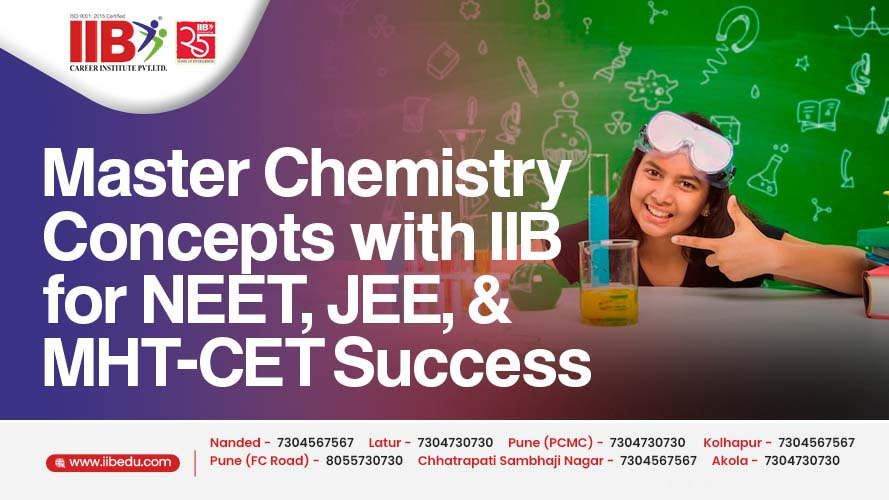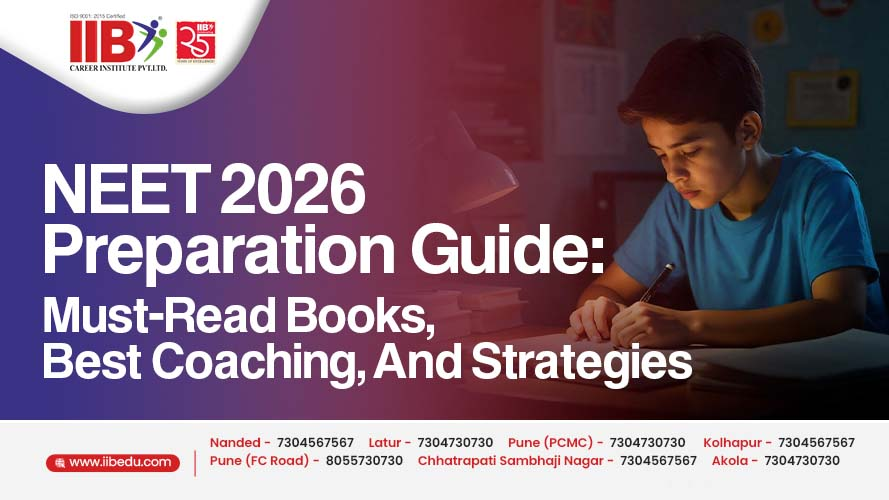Master Chemistry Concepts with IIB for NEET, JEE, And MHT-CET Success
Cracking competitive exams such as NEET, JEE, and CET requires a good command of the subjects: Physics, Chemistry, Biology, and Mathematics. Among them, Chemistry is considered the top-scoring subject as most students find it interesting to study. With the right approach, Chemistry can become the subject that gives aspirants a competitive edge.
Many students believe that rote learning is the key to scoring high in the subject, but it’s not true. Students are required to understand the reaction series, formulas, and terms to answer application-based questions. Knowing the ‘why’ behind every concept enables them to answer the question correctly in less time. Read the full article to know why it is important to get a conceptual understanding of NEET, JEE & MHT CET chemistry preparation.
Why Conceptual Understanding in Chemistry Matters
Chemistry covers a significant part of the competitive exam papers, such as NEET, JEE, and MHT CET, often acting as the deciding factor between good and top scores. Many students fall into the trap of rote learning for inorganic chemistry; therefore, when the questions are around logic, trends, exceptions, or mechanisms, they fail. The conceptual understanding can change the game as students can tackle any kind of problem based on their understanding, for example:
- In Physical Chemistry, knowing mole concepts, thermodynamics, and equilibrium enables students to handle numerical problems with ease and confidence.
- In Organic Chemistry, knowing reaction processes is more useful for forecasting products than relying on recollection.
- Recognizing periodic trends and their logical underpinning helps inorganic chemists understand exceptions and correctly answer assertion-reason problems.
IIB’s Approach to Teaching Chemistry Concepts
At IIB, Chemistry is not just taught, it is made interesting to understand and comprehend. We make chemistry learning interactive by using the following strategies:
- Concept-First Teaching Philosophy
Rather than relying on rote learning, IIB approaches each topic from the base, beginning with fundamental concepts and progressing to complex applications. For example, before teaching redox reactions, we ensure that students grasp electron transfer, oxidation states, and balancing strategies.
- Visual & Practical Learning
During the classroom program, we utilise tools such as diagrams, flowcharts, animations, and real-life analogies to connect the topic. This learning approach makes learning fun and easy to retain in the long term.
We also emphasized digital learning with our concept learning videos to help students watch, learn and repeat anytime they want. IIB’s Chemistry videos are as follows:
- Concept Learning 1: Based on the Cathode Ray Experiment, to help students understand the topic with real-time examples and questions.
- Concept Learning 2: Covers nutrelization reaction to ease the understanding and helps in solving problems around the topic.
- Concept Learning 3: History of Atomic Theory gives you detailed knowledge about who gave the theory, what you learn and other unknown facts.
3. Structured Topic Breakdown
At IIB, we divide chemistry into three parts: Physical, Organic and Inorganic and study them according to their nature. For instance:
- Physical chemistry is tackled through conceptual problem-solving, with each formula developed, comprehended, and applied.
- Organic chemistry relies on logic-based reaction processes and pattern recognition rather than product memorization.
- Inorganic Chemistry is taught using periodic trends, visual memory aids, and logical linkages, which reduces blind memorizing.
4. Reinforcement Through Application
After conceptual understanding, our focus shifts to reinforcement through revision and practice tests. At this time, students attempt a wide range of MCQs and assertion-reason questions based on the topic to analyse their understanding and preparation.
5. Expert Faculty Focusing on Exam Strategy
IIB’s Chemistry faculty are subject experts who have a thorough understanding of NEET and CET patterns. They highlight smart learning methods, error elimination strategies, and how to prioritize and tackle topics under time constraints.
Tips for Students to Build Chemistry Conceptual Strength
Mastering chemistry for competitive exams such as NEET, JEE and MHT CET is not about cramming; it’s about thinking like a chemist and understanding it. Below you will find some tips to study chemistry for the competitive exams:
- Focus on the ‘Why’ Before the ‘What’
Don’t just learn that a reaction occurs; question why it occurs, what causes it, and under what conditions. For example, instead of learning oxidation numbers, understand how electrons flow and why specific elements lose or gain electrons.
- Read NCERT Books Like A Bible
NCERT books are indispensable for exam preparation like NEET, JEE and MHT CET. Read these books thoroughly, focusing on every line, explanation, and definition for better understanding.
- Break It Down: Divide Chemistry into Three Streams
- Physical Chemistry: Improve your mathematics and logic. Create formulas and practice numerical calculations.
- Organic Chemistry: First, learn reaction mechanics, then identify similarities in related reactions.
- Inorganic Chemistry: Concentrate on periodic trends, characteristics, and exception rules; develop mnemonics as needed.
- Use Flowcharts, Tables & Mind Maps
Visualisation aids in better understanding, creating mind maps, tables and flowcharts while studying to elevate your preparation. They also act as one of the important tools for revision.
- Practice Concept-Based Questions Daily
Application learning sharpens your analytical ability. Solve easy to challenging questions based on your preparation stage and get ready to appear for the competitive exam. Most questions in the exam papers are conceptual, this strategy will help you answer them easily in less time.
- Use Concept Videos for Reinforcement
If something feels unclear in the book, don’t skip it. Watch videos related to that or seek expert guidance to get your doubts cleared as soon as possible.
Chemistry preparation for competitive exams such as NEET, JEE and MHT CET requires conceptual understanding, as most of the exam paper is application-based. It is important to understand the concepts when you are preparing for a competition. Top scorers in the competition focus on smart learning techniques where concept clarity stands first, followed by practice, time management, faculty guidance, etc.
At IIB, we offer coaching classes for 11th, 12th and repeater students for NEET, JEE and MHT CET at Nanded, Latur, Pune- PCMC, Kolhapur, Pune-FC Road, Chhatrapati Sambhaji Nagar, and Akola. We have a team of well-experienced faculty and a proven track record of success in competitive exam preparation.


Comments
Post a Comment